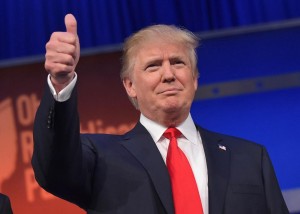America lurches towards a dark form of nationalism
 A bit like the 2008 US presidential election, this one is becoming a meta-exercise, one in which the world beyond America feels heavily and personally invested.
A bit like the 2008 US presidential election, this one is becoming a meta-exercise, one in which the world beyond America feels heavily and personally invested.In 2008, it was about hope. The world was entranced by the idea that a mixed-race man named Barack Hussein Obama could become America’s 44th president after 200 years of white men called Washington, Jefferson, Clinton and Bush. Asia felt kinship with Mr Obama for his Indonesian childhood, Africa for his Kenyan father, and the Middle East for his middle name. His candidature seemed to smite America’s original sins — slavery, racial segregation and discrimination in all its forms — and offer a hopeful template to the wider world.
But in 2016, global interest in the American election is fraught with fear and worry. Around the world, there’s been acute anxiety about what the rise of Donald Trump might possibly mean, even if he doesn’t get to the White House.
Mr Trump has been a serious force in the Republican presidential campaign for seven months, leading, according to RealClearPolitics, national polling averages every day since July 20 last year, with one exception (November 5). And from Cairo to Delhi, Tunis to London, Paris to Berlin, the world wants to know what to make of the domestic delirium that has consistently greeted Mr Trump’s most outrageous suggestions. These include banning Muslims from entering the US, closing mosques and entering all Muslims already in the country on a government database.
Mr Trump’s other proposals have run a similarly inflammatory course. America, he has suggested, should kill the family members of terrorists, something that is barred by the Geneva Conventions. “Torture works,” he has bayed. Recently, he told a little-known and untrue story about American soldiers shooting Muslim rebels in the Philippines a hundred years ago, using bullets dipped in pigs’ blood.
Russia, he has posited, should be allowed to whack radicals in the Middle East and America must just let it get on with the task. He has mocked women and disabled people, and egged on his supporters to manhandle protesters at his rallies.
On Friday, he suggested the “opening up” of libel laws to make it easier to sue people who write “negative” things. Finally, he has declared that America can become great again by hiding behind huge and hastily erected trade barriers. All of this paranoia and crudeness has consistently been cheered by millions of Americans registered as Republican Party voters.
Is fascism on the rise in America, everyone is asking. It is a pertinent question but not the right one. Donald Trump is not a fascist. He is a populist demagogue. It’s coming up to a century since fascism was fashioned, first in Italy and then in Germany, as a violent reaction against a perceived excess of individualism. Both Hitler and Mussolini wanted to regiment their followers’ thoughts and actions. Mr Trump appears to want to do the opposite — to set Americans free of all constraints, all social norms, principles, right-thinking values, legal conventions and international treaties.
He has admittedly taken on some of what we recognise as fascism’s characteristics, namely acute xenophobia, racial prejudice, fear of national decline, aggressive foreign policy positions and a chilling readiness to suspend the domestic rule of law to deal with supposed emergencies. His themes play to white nationalists. He has attacked immigrants in general and Mexicans and Muslims in particular. His campaign suggests that it was white voters who once made America great and that now, they will be enabled to do so again. At the weekend he retweeted a quote attributed to Mussolini and then seemed to exult in the resulting consternation about what that might portend.
This is potentially frightening for everyone wherever in the world they live. For all the talk of China’s rising might, America is still the world’s only superpower, dominating the world’s economic and political systems and with an unrivalled military. The US currently has 12 aircraft carriers; China and Russia have just one each.
America has economic and military control of the Pacific and Atlantic oceans, the most used trade routes in the world, and its massive navy means it has the ability to effectively blockade other nations. It is entrenched in a position of authority in major international banking institutions such as the World Bank and the International Monetary Fund, thus ensuring its crucial importance in the modern-day economic system. Its cultural dominance — and influence — remains unquestionable.
If a sizeable number of Americans — though just a proportion of the Republican Party — root for a man who seems to recognise no moral order, it appears to signal a move towards a dark, ruthless and brutal nationalism that speaks from the gut. Whatever the outcome of Mr Trump’s campaign to be president, the fervour of his fans has revealed an unsettling sense of viciousness and victimisation among a significant number of Americans.
In his 2004 novel, The Plot Against America, Philip Roth wrote an alternative history of the 1940 US presidential election, in which Franklin D Roosevelt was defeated by the allegedly fascist-sympathising aviation pioneer Charles Lindbergh. After that, thuggish violence became more accepted in America.
It may seem as if Roth were uncannily prescient; that he had seen the future, albeit in a slightly different key.
Except that the Trump tale is not about fascism. It’s populism but it could unleash the same violent forces.
No matter what you call it, it’s dangerous.

